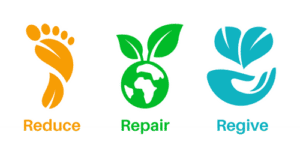
Navigating Environmental Advertising: Intro
As a responsible business employee or owner, navigating environmental advertising is crucial in today’s sustainability-focused landscape. That’s why Play It Green brings you this guide to help you navigate the complexities of environmental advertising claims effectively.
Equip yourself with the knowledge to make informed decisions that align with your company’s values and sustainability goals. Gain a deeper understanding of how to decode and evaluate environmental claims, empowering you to effectively communicate your green initiatives to customers and stakeholders.
Don’t miss out on this opportunity to enhance your environmental marketing strategy and contribute to a greener future. Read on to discover Play It Green’s advice, important links and actionable steps to navigate environmental advertising with confidence.

Navigating Environmental Advertising: Bringing You Up to Date
As valued members of Play It Green, we understand the challenges you face in navigating environmental advertising amidst rising energy prices, cost-of-living concerns, and inflation. That’s why we’re dedicated to equipping you with the knowledge to make informed decisions in this complex landscape.
In recent years there has been increased scrutiny by the UK’s Advertising Standards Authority (ASA) on environmental or ‘green’ advertising claims. Recent cases, including the Keilini Technology ruling in January 2023, have highlighted the need for substantiation and the potential for misleading consumers.
In today’s world, where consumers prioritise eco-friendly credentials, businesses like yours need to understand the significance of environmental claims. Terms like ‘green,’ ‘sustainable,’ ‘natural,’ and more are utilised to attract environmentally conscious customers. However, the credibility of these claims varies, leading to accusations of ‘greenwashing’ or ‘green sheening.’

Navigating Environmental Advertising: Regulatory Bodies
Three main regulatory bodies have set out guidance on any environmental claims your business makes. These bodies are the aforementioned ASA, along with the Competition and Markets Authority (CMA). The final body is the Department for Environment, Food & Rural Affairs (DEFRA). Below we look at the bodies and provide links to the guidance.
ASA
It’s essential to understand the specific sections on environmental claims within the CAP and BCAP Codes from the ASA.
To ensure transparency and integrity, the ASA conducted a thorough review of these rules in September 2021. While they deemed the existing rules sufficient, the increasing prevalence of misleading green claims prompted further research and advice.
In response, the ASA has taken several important steps to address these concerns. They issued guidance in December 2021, aiding marketers and agencies in interpreting the Codes accurately. Moreover, they have focused on specific areas like aviation, cars, waste, animal-based foods, and heating, by conducting targeted enquiries on environmental claims.

To stay up-to-date with evolving practices, the ASA introduced new guidance on green claims in December 2022. They also researched consumer understanding of Carbon Neutral, Net Zero, and Hybrid claims in the electric vehicle market, issuing updated guidance in February 2023.
Furthermore, the ASA provided an advice note following their rulings against mini-heater ads in January 2023, followed by a CAP Enforcement Notice in March 2023.
CMA
The CMA has developed a Green Claims Code and checklist, highlighting the importance of clarity, accuracy, and full substantiation in environmental claims.
The body has also taken proactive measures to ensure compliance in the business sector. They launched a review of environmental claims in the fashion industry on 10 January 2022, with plans to extend their investigation to other sectors. Furthermore, in July 2022, they initiated an inquiry into the eco-friendly product lines of various fashion brands, examining their environmental claims.
To broaden their impact, the CMA launched a project on 23 January 2023. This project aims to scrutinise environmental claims in the sales of household products such as food, drink, cleaning products, personal care items, and toiletries.

DEFRA
To support you when navigating environmental advertising, DEFRA, the Department for Environment, Food & Rural Affairs, has provided comprehensive guidance, principles, and examples. They aim to promote the use of environmentally conscious messaging that aligns with best practices.
By following DEFRA’s guidance, you can ensure that your environmental claims are transparent, accurate, and meaningful to your target audience. This not only builds trust but also contributes to a greener future by encouraging sustainable choices among consumers.

Navigating Environmental Advertising: What Can We Learn?
With the changes happening quite rapidly, several takeaways should be considered.
Regulators are intensifying their scrutiny of businesses regarding environmental advertising and marketing claims. The ASA maintains stringent standards when evaluating green claims, ensuring accuracy and transparency. Marketers should anticipate challenges from the public, campaign groups, competitors, and proactive interventions by the ASA, as seen in the mini-heater rulings.
Clear communication is crucial when making green claims, including providing the full product life cycle, unless explicitly limited. Limitations and qualifications must be prominently and clearly stated, without contradicting the main claim. Substantiating absolute claims, such as “environmentally friendly,” can be particularly challenging, especially when asserting a positive impact on the planet.
When making comparative claims like “environmentally friendlier,” specific specifications are necessary to clarify what the product or service is being compared against, focusing on similar life cycles. Businesses must be capable of substantiating all environmental claims with objective technical documentary evidence, considering the full life cycle unless expressly limited.

To enhance credibility, providing consumers with links to authoritative information, particularly from established UK government sources, can be beneficial.
Here to Support You
At Play It Green, we encourage you to adopt responsible practices, embrace transparency, and navigate environmental advertising with integrity. If you want to receive content like this every week, whilst planting trees and gifting to charity, please join the Play It Green community. It costs less than a coffee and a piece of cake.
If you’re passionate about sustainability, transparency and positive impact. If you want to take your efforts to the next level. Then we encourage you to join the Play It Green community.
For just £5 per month, you’ll have access to a supportive network of like-minded individuals and resources to help you make even more sustainable choices in your daily and working life.
As well as that you will plant lots of trees and regift to a charity of your choice.
Together, we can create a brighter and more sustainable future for all.





